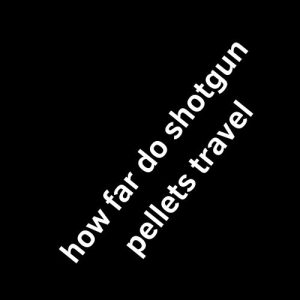Contents
- 1 how far do shotgun pellets travel
- 2 Introduction of how far do shotgun pellets travel
- 3 Understanding Shotgun Basics of how far do shotgun pellets travel
- 4 Factors Affecting Shotgun Pellet Travel : how far do shotgun pellets travel
- 5 The Physics of Shotgun Pellet Travel : how far do shotgun pellets travel
- 6 Practical Pellet Travel Distances : how far do shotgun pellets travel
- 7 Applications and Implications : how far do shotgun pellets travel
- 8 Safety Considerations
- 9 Technological Advancements in Shotgun Ammunition
- 10 Environmental and Ecological Impact
- 11 Future Trends in Shotgun Technology
- 12 FAQ Section of how far do shotgun pellets travel
- 12.0.1 H4: How far can birdshot travel and still be lethal?
- 12.0.2 H4: Does a longer barrel make shotgun pellets travel farther?
- 12.0.3 H4: How does wind affect shotgun pellet travel?
- 12.0.4 H4: Are there any legal restrictions on shotgun pellet travel distance?
- 12.0.5 H4: How do I calculate the maximum range of my shotgun load?
- 13 Conclusion of how far do shotgun pellets travel
- 14 External Resources
Discover how far do shotgun pellets travel and understand their range and impact. Find out all you need to know!
how far do shotgun pellets travel
Introduction of how far do shotgun pellets travel

how far do shotgun pellets travel : Shotguns are adaptable weapons by and large used for hunting, sport shooting, and self-protection. One of the most essential pieces of shotgun execution and security is understanding the development distance of shotgun pellets. This data is principal for trackers to really target game, for sport shooters to deal with their precision, and for all clients to ensure authentic prosperity measures. In this total examination of “how far do shotgun pellets travel,” we will jump into the various components that influence pellet course, take a gander at the material science behind shotgun ballistics, and look at the feasible repercussions for different shotgun applications. By understanding the intricacies of pellet travel, shotgun clients can choose informed decisions about ammunition assurance, shooting methodologies, and security shows. This article will give significant encounters into the unpredictable universe of shotgun ballistics, helping both beginner and experienced shooters with working on their knowledge and capacities.
Understanding Shotgun Basics of how far do shotgun pellets travel
What is a Shotgun?
A shotgun is a gun intended to shoot a shell containing various little pellets or a solitary shot. Not at all like rifles or handguns that discharge a solitary projectile, shotguns commonly scatter a spread of pellets after shooting, making a more extensive compelling area of effect.
Types of how far do shotgun pellets travel
There are several types of shotguns, each with unique characteristics that can affect pellet travel:
- Siphon activity shotguns
- Self-loader shotguns
- Break-activity shotguns (single-barrel and twofold barrel)
- Manual action shotguns
Shotgun Gauge and Its Impact on Pellet Travel
Shotgun check alludes to the interior width of the barrel. Normal measures include:
- 12 gauge (most popular)
- 20 gauge
- 16 gauge
- 28 gauge
- .410 bore (not technically a gauge)
The gauge can influence pellet travel distance, as it affects the volume of shot and powder that can be loaded into a shell.
Factors Affecting Shotgun Pellet Travel : how far do shotgun pellets travel
Shot Size and Material
Shot size is a pivotal figure deciding how far pellets will travel. Bigger shot estimates for the most part venture out farther because of their higher mass and energy. Normal shot sizes include:
- Birdshot: Sizes range from #12 (littlest) to #4 (biggest) Buckshot: Sizes range from #4 (littlest) to 000 (biggest)
- Slug: Single large projectile
Shot material also plays a role:
- Lead: Traditional and dense, travels well but restricted in some areas
- Steel: Less dense than lead, may not travel as far
- Tungsten: Denser than lead, can maintain energy over longer distances
- Bismuth: Similar density to lead, used as a non-toxic alternative
Choke and Barrel Length

Choke is the constriction at the muzzle end of the shotgun barrel, which affects the spread of the shot:
- Full choke: Tightest constriction, longest effective range
- Modified choke: Moderate constriction
- Improved cylinder: Slight constriction
- Cylinder bore: No constriction, widest spread
Barrel length can also influence pellet travel:
- Longer barrels: Generally provide higher muzzle velocity and potentially longer range
- Shorter barrels: More maneuverable but may result in slightly reduced range
Muzzle Velocity and Energy
Gag speed is the speed at which pellets leave the barrel. Higher gag speeds normally bring about longer travel distances. Factors influencing gag speed include:
- Powder charge
- Shell length
- Barrel length
- Shot weight
Muzzle energy, which is related to velocity and pellet mass, also influences travel distance.
Environmental Factors
Several environmental factors can affect pellet travel:
- Wind: Crosswinds can significantly alter pellet trajectory
- Temperature: Colder temperatures may reduce powder burn efficiency
- Humidity: High humidity can affect powder performance
- Altitude: Higher altitudes with thinner air may increase travel distance
The Physics of Shotgun Pellet Travel : how far do shotgun pellets travel
Initial Velocity and Acceleration
At the point when a shotgun is discharged, the start of the powder charge makes quickly growing gases that push the shot section out of the barrel. The underlying speed of the not set in stone by elements, for example,
- Powder charge
- Shot weight
- Barrel length
- Bore diameter
As the pellets leave the barrel, they experience quick deceleration because of air opposition.
Ballistic Coefficient and Drag
The ballistic coefficient (BC) of shotgun pellets is a proportion of their capacity to conquer air opposition. Factors influencing BC include:
- Pellet shape
- Pellet density
- Pellet diameter
Pellets with a higher BC will maintain their velocity and energy over longer distances.
Drag forces act on the pellets throughout their flight, causing them to slow down. The drag coefficient varies based on pellet shape and velocity.
Trajectory and Range
Shotgun pellets follow a parabolic trajectory influenced by:
- Initial velocity
- Angle of elevation
- Gravity
- Air resistance
The maximum range is achieved at an elevation angle of approximately 30 degrees, but practical shooting rarely occurs at this angle.
Energy Loss and Terminal Velocity
As pellets travel, they lose energy due to air resistance. The rate of energy loss depends on factors such as:
- Initial velocity
- Pellet mass
- Pellet shape
- Air density
Eventually, pellets reach terminal velocity, where the force of gravity is balanced by air resistance.
Practical Pellet Travel Distances : how far do shotgun pellets travel
Effective Range for Different Shot Sizes
The effective range varies significantly based on shot size:
| Shot Size | Effective Range (yards) |
|---|---|
| #9 (bird) | 20-30 |
| #6 (bird) | 30-40 |
| #4 (bird) | 40-50 |
| #4 (buck) | 30-50 |
| 00 (buck) | 40-60 |
| Slug | 75-100 |
Note: These ranges are approximate and can vary based on other factors.
Maximum Range Considerations
While pellets can travel much farther than their effective range, it’s crucial to consider the maximum range for safety reasons:
- Birdshot: Can travel up to 200-300 yards
- Buckshot: Can travel up to 400-600 yards
- Slugs: Can travel up to 1000 yards or more
It’s important to note that pellets are still potentially dangerous at these extreme distances, even though they may not have sufficient energy for ethical hunting or effective self-defense.
Patterns and Spread
The pattern of shotgun pellets expands as distance increases:
- At close range (0-10 yards): Tight pattern, behaves almost like a single projectile
- Medium range (10-30 yards): Pattern begins to spread, optimal for most hunting scenarios
- Long range (30+ yards): Wide pattern, reduced pellet density and energy
Understanding pattern spread is crucial for effective and ethical shooting.
Applications and Implications : how far do shotgun pellets travel

Hunting Considerations
Different game animals require different shot sizes and ranges:
- Small game (rabbits, squirrels): #6 to #4 shot, 20-40 yards
- Upland birds (pheasant, grouse): #6 to #4 shot, 20-45 yards
- Waterfowl: #2 to BB shot, 30-50 yards
- Turkey: #4 to #6 shot, 20-40 yards
- Deer (with slugs or buckshot): 00 buckshot or slugs, 50-75 yards
Hunters must consider the effective range of their chosen load to ensure ethical and efficient harvests.
Sport Shooting and Competition
In clay target sports, understanding pellet travel is crucial:
- Skeet: Typical shooting distances of 15-25 yards
- Trap: Shooting distances of 16-27 yards
- Sporting clays: Various distances, typically 20-60 yards
Competitors must choose appropriate chokes and loads for different target presentations.
Self-Defense and Home Protection
For self-defense applications, shotgun users should consider:
- Indoor distances: Typically 3-7 yards
- Potential for over-penetration through walls
- Pattern spread at close range
- Legal implications of ammunition choice
Safety Considerations
Understanding Safe Shooting Distances
Knowing the maximum travel distance of shotgun pellets is crucial for safe shooting practices:
- Always be aware of what lies beyond your target
- Use appropriate backstops when target shooting
- Consider the potential for ricochets off hard surfaces
Legal and Ethical Implications
Understanding pellet travel distances is essential for:
- Complying with hunting regulations on minimum shooting distances from roads and buildings
- Ensuring ethical shots on game animals
- Avoiding property damage or unintended injuries
Proper Training and Education
Shotgun users should:
- Attend safety courses and shooting clinics
- Practice regularly to understand their firearm’s capabilities
- Stay informed about ballistics and ammunition performance
Technological Advancements in Shotgun Ammunition
High-Performance Loads
Modern shotgun ammunition manufacturers have developed loads that can extend effective range:
- Tungsten Super Shot (TSS): Ultra-dense material for increased range and energy retention
- Flight Control wads: Help maintain tighter patterns at longer distances
- Copper-plated shot: Resists deformation for more consistent patterns
Specialized Chokes and Barrels
Advancements in choke design and barrel technology include:
- Ported barrels to reduce recoil and muzzle jump
- Interchangeable choke systems for versatility
- Custom chokes designed for specific applications or loads
Ballistic Calculators and Apps
Modern technology aids in understanding pellet travel:
- Smartphone apps that calculate shot patterns and trajectories
- Online ballistic calculators for different shot sizes and loads
- High-speed photography and chronographs for detailed analysis
Environmental and Ecological Impact
Lead vs. Non-Toxic Alternatives
The travel distance of shotgun pellets has ecological implications:
- Lead shot: Can contaminate environments and poison wildlife
- Steel and other non-toxic alternatives: May have different travel characteristics
- Regulations in many areas require non-toxic shot for waterfowl hunting
Habitat Considerations
Understanding pellet travel is important for:
- Minimizing disturbance to non-target species
- Preventing damage to sensitive habitats
- Complying with buffer zone requirements near protected areas
Future Trends in Shotgun Technology
Smart Shotgun Systems
Emerging technologies may influence how we understand and measure pellet travel:
- Electronic tracking of shot patterns
- Integrated rangefinders and ballistic computers
- “Smart” chokes that adjust based on target distance
Advanced Materials
New materials for shot and barrels may change pellet travel characteristics:
- Composite materials for lighter, stronger barrels
- Novel alloys for shot with improved ballistic coefficients
- Biodegradable shot for reduced environmental impact
FAQ Section of how far do shotgun pellets travel
H4: How far can birdshot travel and still be lethal?
Birdshot can remain potentially lethal up to 100-150 yards, depending on the shot size and environmental conditions. However, its effective range for hunting is typically much shorter, usually within 50 yards.
H4: Does a longer barrel make shotgun pellets travel farther?
For the most part, a more extended barrel can increment gag speed, which might bring about marginally expanded range. Be that as it may, the thing that matters is in many cases negligible past a specific point, and factors like gag and ammo fundamentally affect pellet travel distance.
H4: How does wind affect shotgun pellet travel?
Wind can significantly affect pellet travel, especially for smaller shot sizes. Crosswinds can cause pellets to drift off course, potentially altering point of impact by several inches or even feet at longer ranges.
H4: Are there any legal restrictions on shotgun pellet travel distance?
While there are no particular regulations managing greatest pellet travel distance, numerous purviews have guidelines about least shooting good ways from structures, streets, and property lines. Continuously look at nearby regulations and guidelines prior to shooting.
H4: How do I calculate the maximum range of my shotgun load?
Calculating the exact maximum range is complex due to numerous variables. However, you can estimate it using ballistic calculators or consult manufacturer data for specific loads. Remember that maximum range is much greater than effective range and should be considered for safety purposes.
Conclusion of how far do shotgun pellets travel
Understanding how far shotgun pellets travel is essential for mindful and powerful shotgun use. This information envelops many variables, from the material science of ballistics to pragmatic contemplations in hunting, sport shooting, and self-preservation. By appreciating the complexities of shot size, gag choice, ecological elements, and the most recent mechanical headways, shotgun clients can pursue informed choices that upgrade their presentation and guarantee security.
As we’ve investigated, the movement distance of shotgun pellets fluctuates fundamentally founded on various factors, and taking into account both the viable reach and the most extreme reach for various applications is fundamental. Whether you’re a tracker going for the gold collect, a serious shooter taking a stab at precision, or a property holder worried about self-preservation, understanding pellet head out enables you to utilize your shotgun all the more really and mindfully.
Planning ahead, progressing headways in ammo, gun innovation, and ballistic comprehension vow to additionally refine our insight and capacities with respect to shotgun pellet travel. By remaining informed, rehearsing routinely, and continuously focusing on security, shotgun devotees can proceed to appreciate and succeed in their picked applications while being capable stewards of their game and the climate.
External Resources
For further information on shotgun pellet travel and related topics, consider exploring these resources:
- National Shooting Sports Foundation (NSSF) – Shotgun Safety and Education: https://www.nssf.org/safety/
- Ballistic Calculator for Shotguns by Federal Premium Ammunition: https://www.federalpremium.com/ballistics-calculator/
- National Rifle Association (NRA) – Shotgun Resources: https://explore.nra.org/interests/shotguns/
- U.S. Fish and Wildlife Service – Non-Toxic Shot Regulations: https://www.fws.gov/birds/bird-enthusiasts/hunting/nontoxic.php
These resources provide additional information on shotgun ballistics, safety, and regulations to supplement the knowledge gained from this article.


1 thought on “how far do shotgun pellets travel”